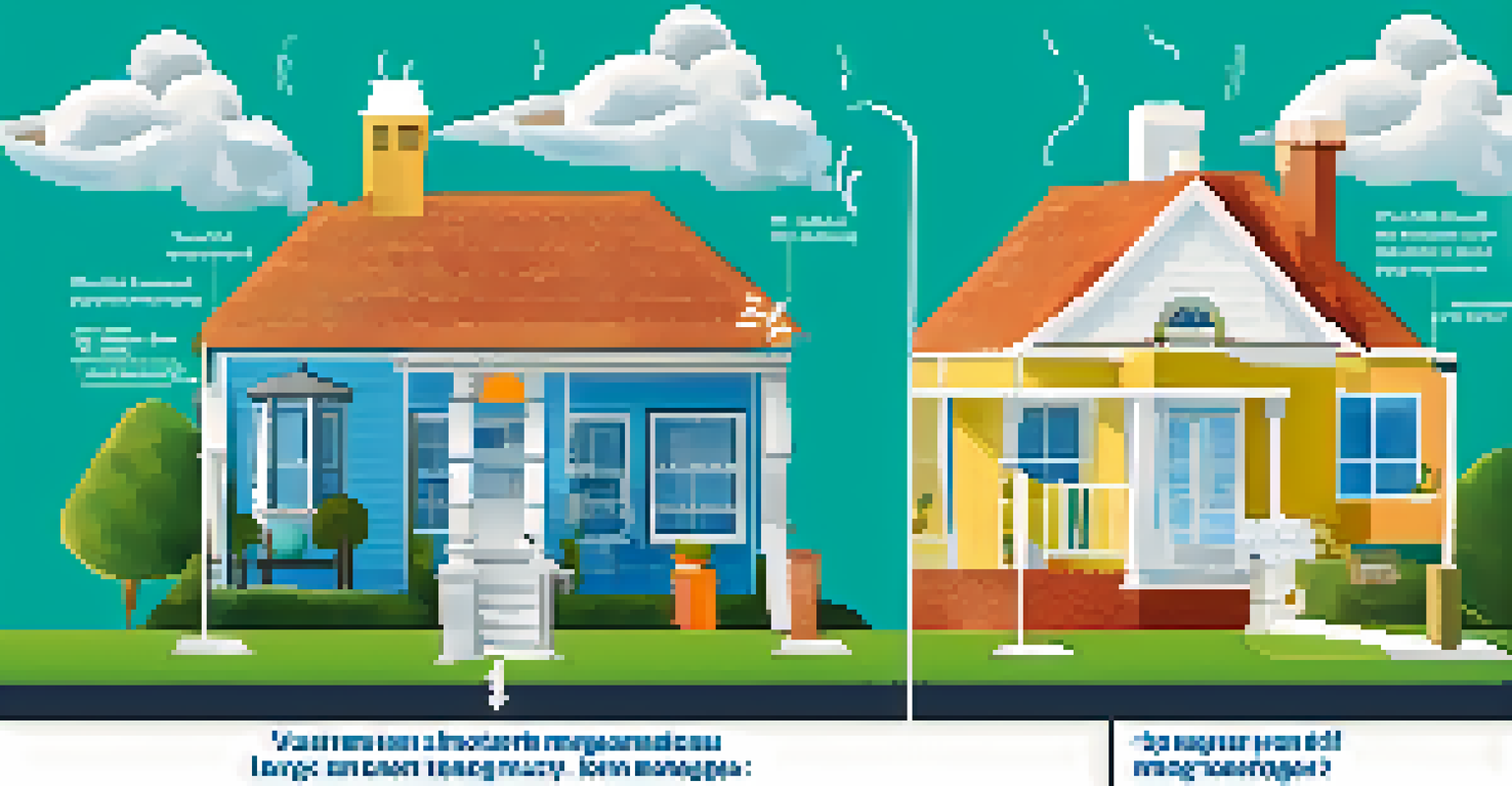How to Choose Between Short-Term and Long-Term Mortgages

Understanding Short-Term Mortgages: Pros and Cons
Short-term mortgages typically last from 1 to 10 years, offering lower interest rates compared to longer options. This can mean significant savings over time, as you pay less interest overall. However, the trade-off is higher monthly payments, which might stretch your budget.
A mortgage is a loan secured by real estate. This allows the borrower to access larger amounts of money than they would otherwise be able to secure without such collateral.
One of the main advantages of a short-term mortgage is the ability to build equity quickly. Since you're paying off the principal faster, you own a larger portion of your home sooner. This can be a great motivator if you plan to stay in your home long-term.
On the flip side, if your financial situation changes and you can't keep up with those payments, it could lead to stress and potential foreclosure. So, while short-term mortgages can save you money, they can also come with higher risks.
Exploring Long-Term Mortgages: Benefits and Drawbacks
Long-term mortgages, often ranging from 15 to 30 years, offer lower monthly payments, making homeownership more accessible. This can be particularly appealing for first-time buyers or those on a tight budget. However, the trade-off is that you will pay more in interest over the life of the loan.

One of the key benefits of long-term mortgages is the flexibility they offer. With lower payments, you can allocate more of your budget to other expenses, such as saving for retirement or funding your children’s education. This can provide a sense of financial security.
Short-Term Mortgages: Fast Equity
Short-term mortgages allow quicker equity buildup due to higher monthly payments and lower overall interest costs.
Yet, the downside is that it may take longer to build equity in your home. If you plan on moving in a few years, you might not see a significant return on your investment, as much of your early payments go toward interest rather than the principal.
Assessing Your Financial Situation: Key Considerations
Before choosing between short-term and long-term mortgages, take a close look at your financial situation. Consider your income stability, existing debts, and monthly expenses. This analysis will help you determine which mortgage type fits your budget.
Your credit score is like a report card for your financial history; it can make the difference between a good mortgage and a bad one.
For instance, if you have a steady job and little debt, a short-term mortgage may be manageable and beneficial. On the other hand, if you're just starting your career or have other financial commitments, a long-term mortgage might be the better option.
Additionally, think about your future plans. If you foresee changes, such as a potential job relocation or starting a family, a long-term mortgage could offer the flexibility you need.
Evaluating Interest Rates: Short vs. Long-Term
Interest rates can significantly impact your mortgage choice. Short-term mortgages often come with lower rates, which can save you thousands over the life of the loan. However, these rates can vary based on market conditions and your credit score.
In contrast, long-term mortgages typically have higher interest rates. While the monthly payments may be lower, the total cost of borrowing can add up over time. This means you need to weigh the benefits of lower monthly payments against potentially higher overall costs.
Long-Term Mortgages: Budget-Friendly
Long-term mortgages offer lower monthly payments, making homeownership more accessible but increasing total interest paid over time.
It's wise to shop around and compare rates from different lenders. Even a small difference in interest rates can lead to substantial savings or costs over the lifespan of the mortgage.
Considering Your Lifestyle and Future Plans
Your lifestyle and future plans play a crucial role in deciding between mortgage types. If you plan to settle down and stay in one place, a long-term mortgage might suit you better. It provides stability and the comfort of knowing your payments won’t significantly change.
On the other hand, if you're someone who enjoys flexibility and may move frequently, consider a short-term mortgage. It can give you the freedom to pay off your loan quicker and potentially move on to your next adventure sooner.
Ultimately, think about how long you plan to live in your home and how your lifestyle might change. This foresight can help you make a more informed decision.
The Impact of Credit Scores on Mortgage Choices
Your credit score is a vital factor when choosing a mortgage. A higher credit score can qualify you for better interest rates, making short-term mortgages more appealing. Conversely, if your credit score is lower, you might face higher rates, making long-term loans a more sensible option.
Improving your credit score before applying can save you a lot of money in interest. Simple actions like paying down debts and ensuring bills are paid on time can make a significant difference. It’s worth investing some time to boost your score.
Credit Scores Affect Mortgage Rates
A higher credit score can secure better interest rates, making short-term loans more appealing, while lower scores may necessitate long-term options.
Remember, lenders will look at your credit history, so understanding your score helps you know what options are available. The better your score, the more favorable terms you can negotiate.
Consulting Professionals: A Wise Step
Navigating the mortgage landscape can be overwhelming, and seeking professional advice can be invaluable. Mortgage brokers or financial advisors can provide insights tailored to your specific situation, helping you weigh the pros and cons of each option.
They can also guide you through the application process, ensuring you understand all the terms and conditions. This knowledge can empower you to make a decision that aligns with your financial goals.

In the end, investing in professional advice may save you money and stress, making it a worthwhile consideration for any home buyer.